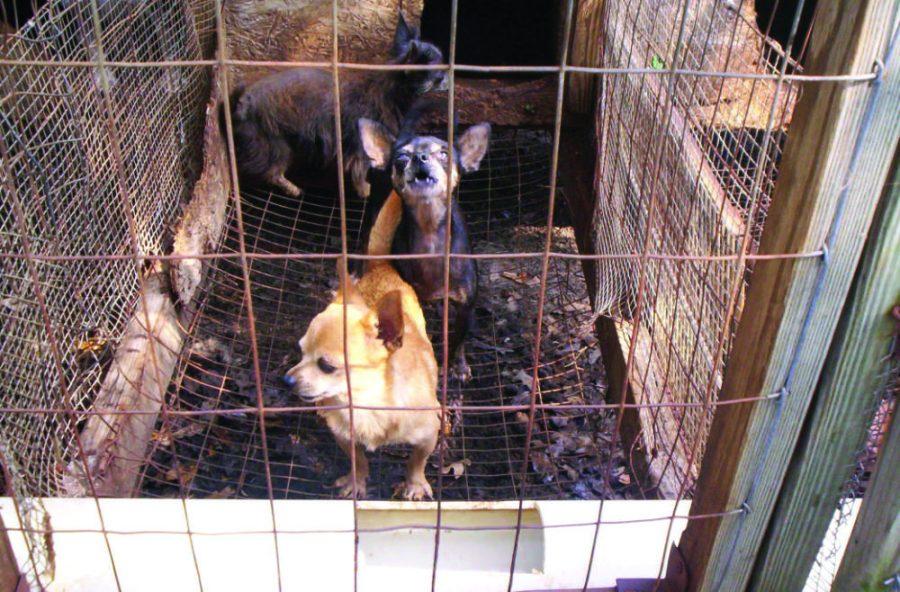Hollywood’s ruff patch with animal rights
Courtesy of PETA via Wikimedia Commons
Puppy mills deny dogs a good quality of life, an animal rights violation.
February 21, 2017
“A Dog’s Purpose,” is a movie that tells the story of a dog who gets reincarnated as different dogs, each serving a purpose in their human’s life.
I’m a sucker for movies that involve animals, so I knew I was going to be in the theatre with a box of tissue in hand when it was released! Every time I saw the trailer I made it a point to tell whoever was with me that I couldn’t wait for that movie to come out, but on Jan. 18 TMZ released a different kind of video.
The video released titled, “Terrified German Shepherd Forced Into Turbulent Water” showed a trainer forcing the dog into the water to film a rescue scene despite the dog resisting. The video goes on to show the trainer forcefully putting the dog in the water. The clip cuts to a new scene of the dog going under the rushing water and having to be rescued by the crew.
As an animal lover, I went into a furious outrage. How could they do that to that poor dog? We are so technologically advanced and you mean to tell me that they can’t CGI this scene?
I was all on board with PETA, who called for the boycott of this movie, but the more I saw the video the more I started to doubt the validity of the footage, which showed a clear skip from one situation to another, raising the possibility we weren’t getting the full picture. While everyone was posting their outrage on Facebook, an investigation was launched by an independent, third party animal cruelty expert.
About a month and a canceled movie premiere later, the verdict was that the video had been deliberately manipulated to showcase a serious case of animal cruelty. Questions were also raised on the ethics of and motive behind those who made the video due to the amount of time that had passed from its filming to its release. While the investigation did conclude that “no animals were harmed in the making of this film,” the debate about animal rights was already rekindled in the public.
The case of “A Dog’s Purpose” brought up the concept of speciesism, the discrimination or bias that favors one’s own species over another. Human beings have always thought themselves the top of the food chain, an evolved animal that gets to show control and dominance over others in the animal kingdom, as thousands of years of history has showed us. While the idea of animal rights is not new, in recent years it has gained more ground than before, especially when it comes to animal use for entertainment.
I remember when I was 12, my mother took my sister and I to the circus. I was in awe of the flashy outfits and the flexible acrobats but also slightly scared of the clowns. When it was time for the elephants and tigers to perform my feelings changed completely. I was no longer in awe, because what I saw was an animal, scared with its head hung down that was forced to jump through fiery hoops and stand on its back legs. That was the last time I went to the circus. As years went by the more I researched the treatment of animals for human profit, the more disgusted I became at my own species’ actions.
Humans think they are superior to every other species on this planet. This superiority complex can manifest itself in actions and ideas that completely disregard another life because of how egocentric we can be. There are plenty of things that humans want, that they wish for, that they do not need and where an animal’s welfare is truly sacrificed, like fur coats. In an age where we are able to develop fabrics from natural sources, many still wish to adorn their bodies with the skin and fur of animals. Unfortunately, it doesn’t end with the fashion industry.
For years, we have stripped away the natural resources of this planet using oil, coal and other elements to power our daily lives and deepen our pockets. While many believe we won’t see the consequences of those actions for years, if at all, the reality is that we are seeing these changes during our lifetime. According to NASA, current warming trends are significantly increased and it is most likely human induced.
Our human “needs” are damaging the planet not only for ourselves, but for all other species too. The oceans’ temperatures are getting warmer and are affecting the ecosystems that are found beneath the surface of the water. To put a picture in your mind, think of the Great Barrier Reef, one of nature’s wonders. This past year rumors spread throughout the world of the complete destruction of the reef. Even though these claims were scientifically false, it isn’t all good news. According to CNN, the truth is that the Great Barrier Reef is in serious trouble with 93% of it being affected by bleaching. The color change is brought about when the reef is under tremendous stress due to changes in temperature, light and nutrients which causes it to expel symbiotic algae and turn white. If the reef is lost, all the marine animals that call it home and all the animals that need those animals to survive will be greatly affected and face the possibility of extinction.
With the temperatures rising we have also seen a rise in sea levels due to the shrinking of ice sheets. The melting of the ice sheets means serious trouble for polar bears and other species that live in the polar ice caps. These snow white mammals give birth and hunt on sea ice and use it to travel from one region to another, which is crucial for their survival. According to WWF Global, the global polar bear numbers are projected to decline by 30% by 2050.
It is easy for humans to believe that our actions don’t contribute to the destruction of the planet’s animals, but the reality is different. Since the start of the Industrial Revolution, the acidity of the surface ocean waters has increased by about 30% due to humans releasing more carbon dioxide which is then absorbed by the ocean.
While these examples might seem far-fetched for some, the idea of speciesism can be found closer to home. Animal abuse in the United States is sadly still common. To satisfy humans’ “wish” for profit, illegal dogfighting, puppy mills and other businesses where animals are harmed still exists.
However, activists and people in general have begun to become more educated on the idea that non-human lives are also valuable and worthy of the right to live the best quality of life possible. Entertainment industry giants are feeling the pressure of providing better treatment to the animals that make them money.
After SeaWorld came under scrutiny for its treatment of Orca whales after the release of the highly acclaimed documentary “Blackfish,” it saw a major decrease in profits prompting them to end the Orca whale shows. SeaWorld has also recently announced that they will no longer breed orcas in captivity for their theatrical shows.
Another giant company that took a hit, and one that I am very happy about, is the legendary circus Ringling Bros. and Barnum and Bailey. After pressure to retire their elephants, Ringling Bros. saw sales in their tickets drop, causing them to put a stop to the “Greatest Show on Earth.” Their last performance is scheduled for May 2017.
The video for “A Dog’s Purpose” helped the topic of animal rights in entertainment resurface, but the topic shouldn’t be only brought back up when a stomach-churning clip is shown. We have a long history of believing humans hold a higher position on the totem pole than other animals, but what we should believe is that with this position comes a responsibility not only for our well-being but the well-being of all animals. “A Dog’s Purpose” was meant to show the importance and impact that a dog, or any animal, can have in a human’s life ,but we should also consider the impact we have in theirs.






